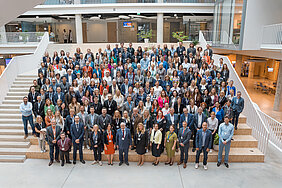The Institute of Oncology Ljubljana (IOL) continues to play a pivotal role in shaping the future of cancer screening across Europe, taking a leadership position in ensuring the sustainability of organised screening programmes amidst new recommendations and evolving standards. Through its active involvement in the EUCanScreen project, IOL is contributing significantly to the advancement of cancer prevention efforts at a European level.
The Europe’s Beating Cancer Plan has called for a new EU-Supported Cancer Screening Scheme to assure high performance of cancer screening programs across all the Member States (MS). The general objective of EUCanScreen is to assure sustainable implementation of high-quality screening for breast, cervical and colorectal cancer as well as implementation of the recently recommended screening programs – for lung, prostate and gastric cancers.
EUCanScreen will facilitate the reduction of cancer burden and achieving equity across the EU.
Seven specific objectives have been set for EUCanScreen:
1) Ensuring full implementation of evidence-based, cost-effective and quality-assured screening programmes for breast, cervical and colorectal cancers.
2) Preparing for implementation of evidence-based, cost-effective and quality-assured screening programmes for lung, prostate and gastric cancers.
3) Ensuring proper program governance and sustainability.
4) Ensuring better-quality, timelier and comparable data collection and monitoring of screening programmes.
5) Ensuring equal access of eligible EU citizens to screening programmes and reducing cancer inequalities.
6) Ensuring capacity building in cancer screening.
7) Ensuring collaboration and coherence with related projects funded under EU Programmes.
The work-plan of EUCanScreen has been built on the results of previous and ongoing major EU activities in screening; it is designed within eleven closely interlinked work-packages.
Why is the project important for Slovenia?
In Slovenia, the EUCanScreen project is led by the Institute of Oncology Ljubljana, under the guidance of Asst. Prof. Urška Ivanuš, MD, a specialist in public health. Urška Ivanuš is the Head of the National Cervical Cancer Screening Programme and ZORA Registry, as well as the Chair of the National Screening Committee. Her leadership ensures that Slovenia remains at the forefront of cancer screening innovation and public health advancements within Europe.
The project holds significant value for Slovenia, as it will contribute to the further development and enhancement of national cancer screening programmes.
"Slovenia has taken a leading role in European efforts to ensure the long-term sustainability of organised screening programmes, particularly in light of new recommendations and the expansion of screening initiatives," says Asst. Prof. Ivanuš.
Through its participation, Slovenia will play a pivotal role in establishing and strengthening recommended screening programmes in countries where they have yet to be implemented, thus bolstering the overall effectiveness of cancer prevention across Europe. This will ensure that Slovenia remains at the forefront of the European fight against cancer, making a substantial impact on public health in both Slovenia and the broader European community.
International dimension of the project
The consortium is bringing together well-performing screening programs to those that require substantial improvements. Altogether 29 partnering countries are represented in the consortium, including 25 EU MS, Ukraine, Moldova, Norway and Iceland. The project will be coordinated by the University of Latvia, and will involve additional 28 competent authorities, 61 affiliated partners, and 7 associated partners.
The Slovenian National Institute of Public Health (NIJZ) is also participant in the project. Consortium highlights the international significance of EUCanScreen, which unites leading experts and renowned scientific institutions in a collaborative effort to advance cancer screening and prevention.
Project duration and budget
The duration of the EUCanScreen will be 48 months. Overall budget is 38.749.935,32 EUR. The project is slated for completion in June 2028, culminating in a final conference. This event will showcase the project's achievements, highlight best practices, and demonstrate its significant impact on enhancing cancer screening and reducing the burden of cancer across Europe.
“Funded by the European Union. Views and opinions expressed are however those of the author(s) only and do not necessarily reflect those of the European Union, European Health, Digital Executive Agency (HADEA) and Ministry of Health of Republic of Slovenia. Neither the European Union, the granting authority, nor Ministry can be held responsible for them.”







